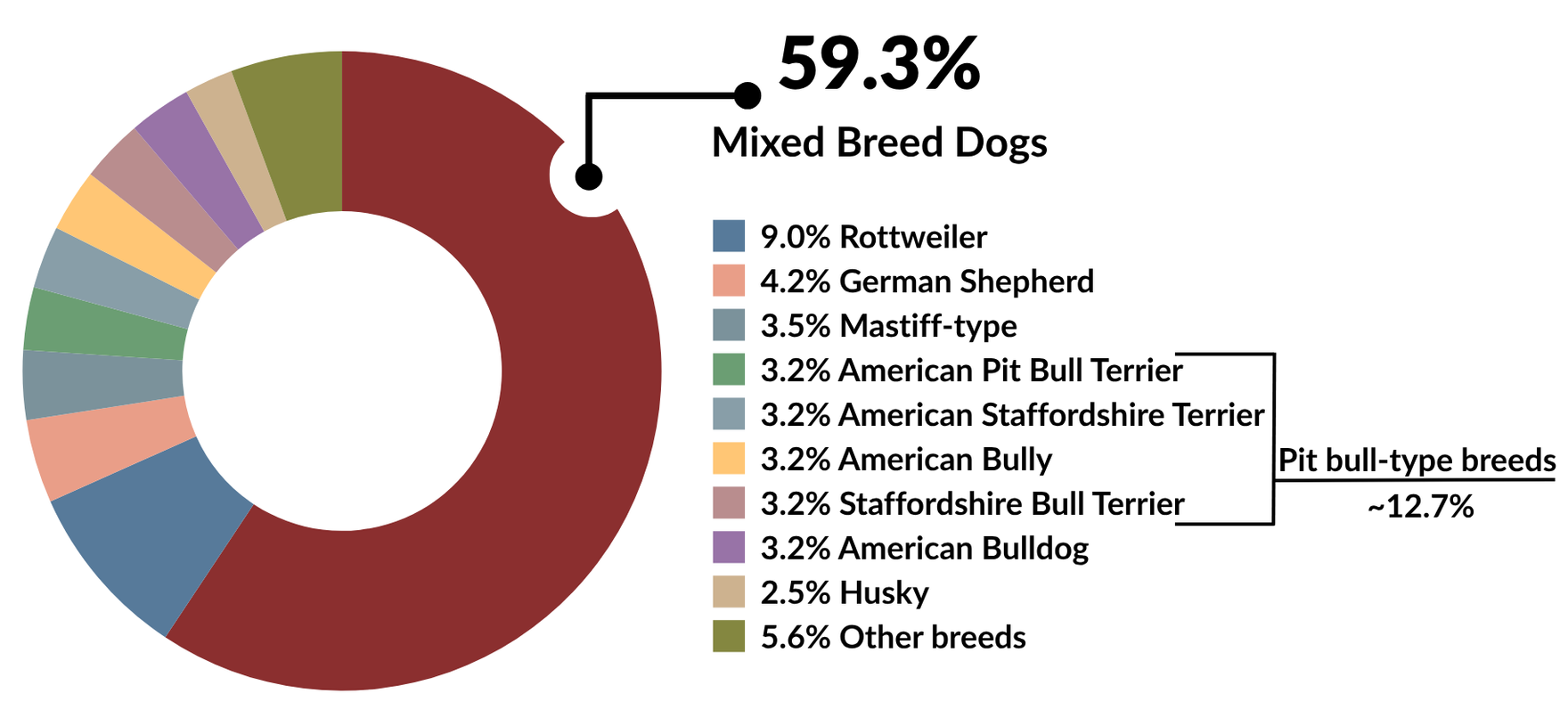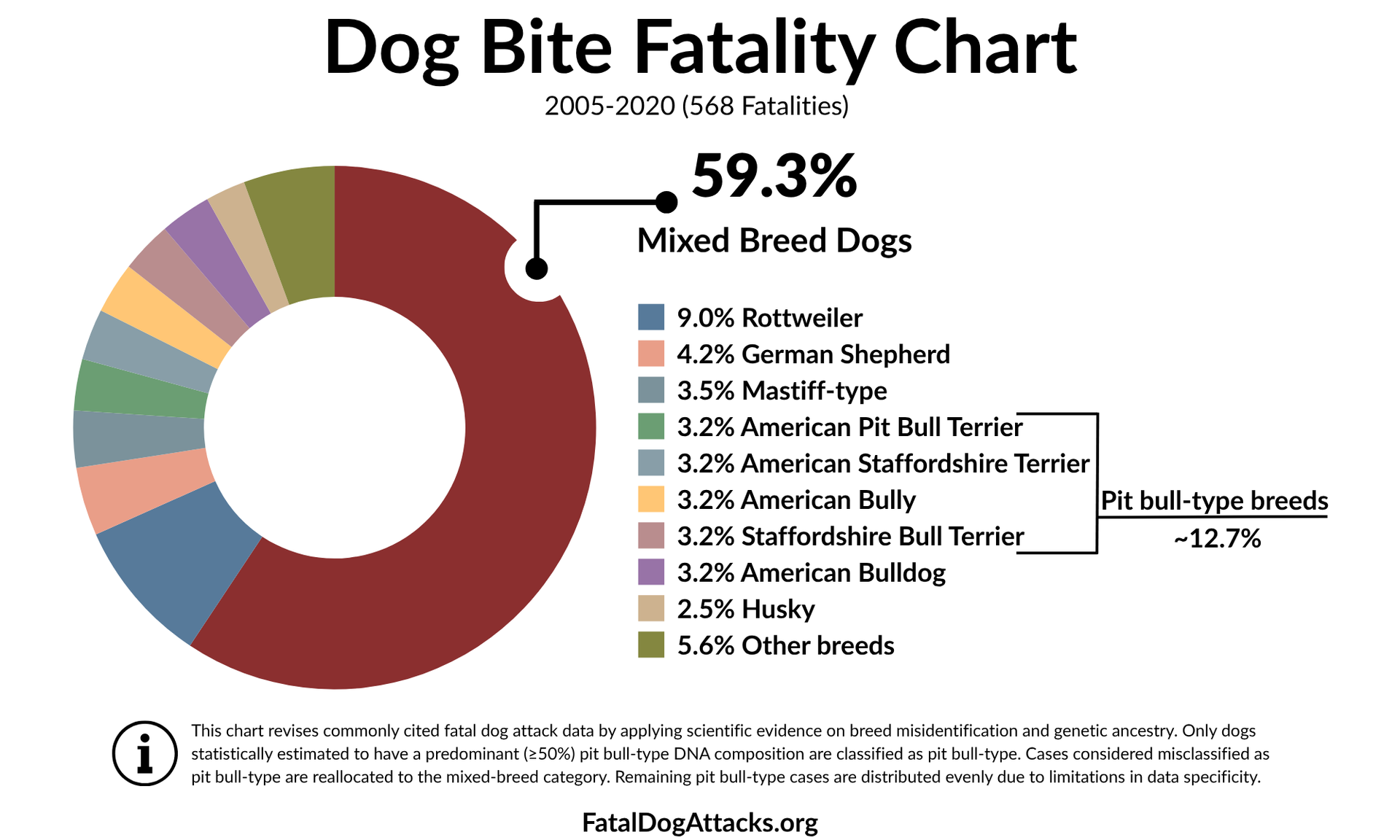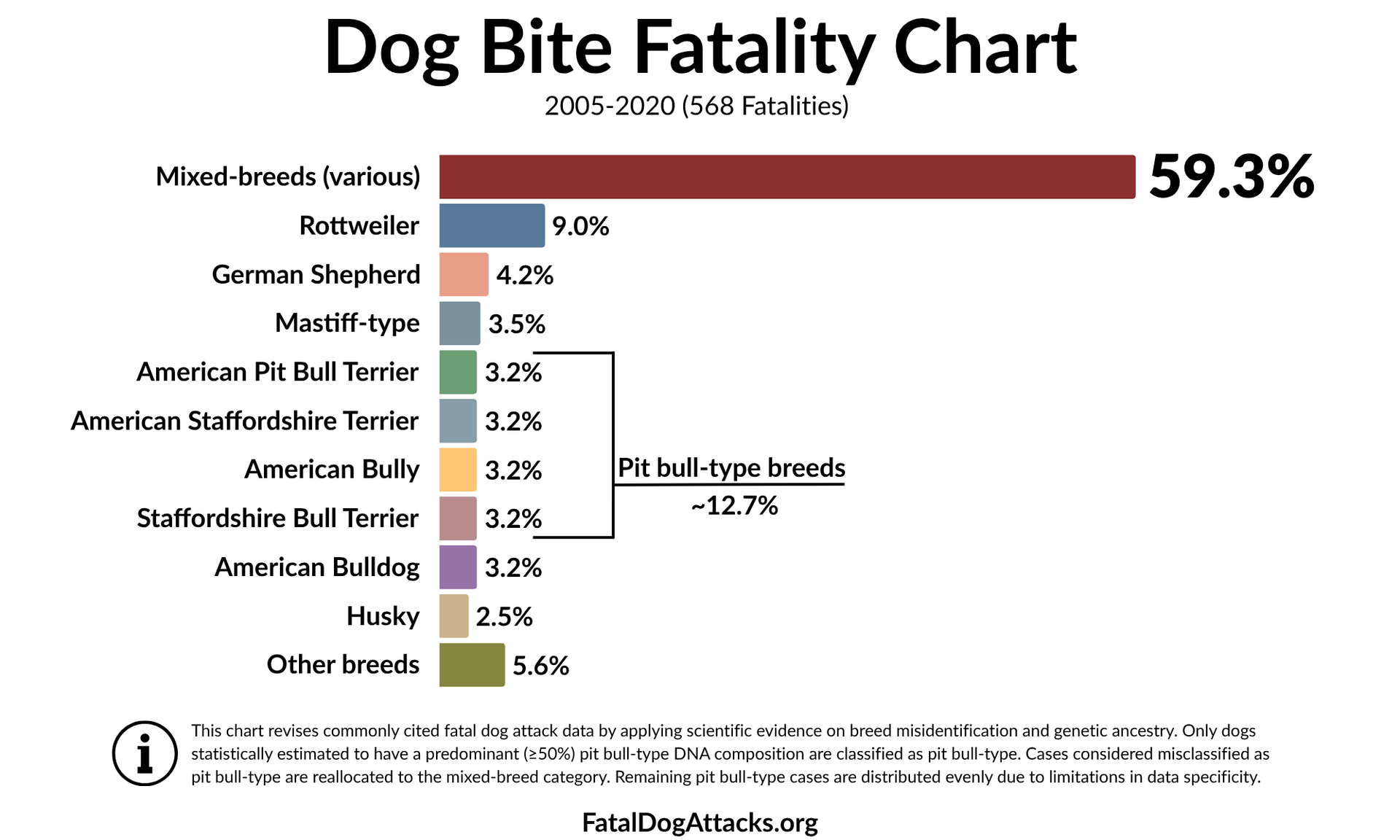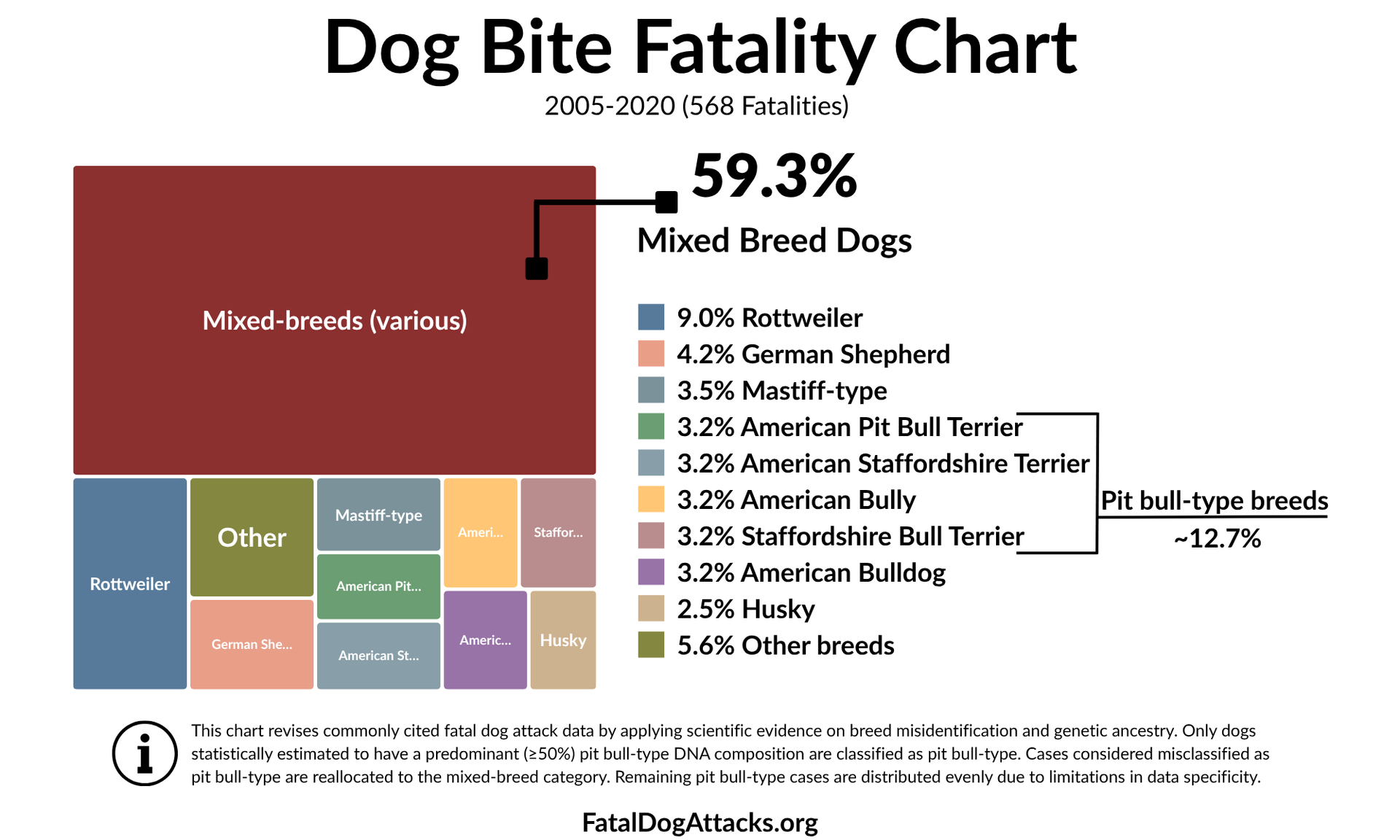
Fatal Dog Attacks In The U.S.
Fatal Dog Attacks
According to CDC data, there are an average of 43 fatal dog attacks each year in the United States, most often affecting adults (~50%), followed by children (~40%) and infants (~10%). Since 2016, over 83 breeds and mixed breeds have been implicated in fatal attacks, including Akitas, Boxers, Doberman Pinschers, German Shepherds, Great Danes, Huskies, Labrador Retrievers, Mastiffs, Rottweilers, and pitbull-types, among others. Scientific studies have determined that the leading causes of fatal dog attacks stem from preventable factors such as irresponsible ownership, neglect or abuse, failure to neuter dogs, and inadequate supervision of large or strong dogs around infants and children.
Contrary to unreliable information about breed-specific risk related to certain breeds, the American Veterinary Medical Association (AVMA), the Centers for Disease Control and Prevention (CDC), and numerous scientific studies have determined that a dog's breed does not determine aggression, bite strength, or its propensity to bite. While every fatal dog attack is tragic, the majority of dog bite-related fatalities (DBRFs) are the result of human-controlled factors specific to the circumstances surrounding the incident.
ⓘ Sources: CDC DBRF data | AVMA dog bite risk | Dog bite studies | Recent DBRF data
▷ Updated: 12/31/2025
Dog Bite-related Statistics
Statistics & data on fatal dog attacks
Dog Bite Fatality Chart
2005-2020 (568 Fatalities)

| Breed | Fatalities (2005-2020) | % of Total |
|---|---|---|
| Mixed-breeds (various) | 337 | 59.3% |
| Rottweiler | 51 | 9.0% |
| German Shepherd | 24 | 4.2% |
| Mastiff-type | 20 | 3.5% |
| American Pit Bull Terrier | 18 | 3.2% |
| American Staffordshire Terrier | 18 | 3.2% |
| American Bully | 18 | 3.2% |
| Staffordshire Bull Terrier | 18 | 3.2% |
| American Bulldog | 18 | 3.2% |
| Husky | 14 | 2.5% |
| Other breeds (various) | 32 | 5.6% |
| Total | 568 |
ⓘ This chart revises commonly cited fatal dog attack data by applying scientific evidence on breed misidentification and genetic ancestry. Only dogs statistically estimated to have a predominant (≥50%) pit bull-type DNA composition are classified as such. Cases considered misclassified are reallocated to the mixed-breed category. Remaining pit bull-type cases are distributed evenly due to limitations in data specificity. As the most popular dog type in the U.S., pit bulls are underrepresented in fatality statistics, accounting for ~12.7% of fatalities despite comprising ~20% of the dog population.
83+
Number of breeds involved in fatal attacks in the U.S. since 2016, confirming that serious dog-bite incidents are not a breed-specific issue.
Source: DBRF data
0.00001%
The risk of being fatally attacked by a dog (of any breed). On average every year in the U.S., insects cause more fatalities (~110) than dogs (~43).
Source: CDC WONDER
9%
Percentage of a dog's behavior attributable to breed, confirming that breed has a minimal impact on behavior.
Source: Science.org study
84%
Percentage of fatal dog attacks that involve dogs that aren't neutered. Intact male dogs are associated with higher rates of aggression.
Source: AVMA study
Breeds Implicated In Fatal Dog Attacks
Breeds implicated in fatal dog attacks since 2016
| Breeds: 1-23 | Breeds: 24-46 | Breeds: 47-83+ |
|---|---|---|
| Akita | Dalmatian | Labrador Retriever-Shepherd mix |
| Alaskan Husky mix | Doberman Pinscher | Leopard Cur mix |
| American Bulldog | Doberman Pinscher mix | Malamute-Wolf Hybrid mix |
| American Bulldog mix | Dogo Argentino | Mastiff |
| American Bulldog-Great Pyrenees mix | Dutch Shepherd | Mastiff mix |
| Australian Cattle Dog mix | English Bulldog | Mastiff-Great Dane mix |
| Belgian Malinois | English Mastiff | Mastiff-Labrador Retriever mix |
| Belgian Malinois-Bulldog mix | French Bulldog mix | Mastiff-Presa Canario mix |
| Black Mouth Cur mix | German Shepherd | Neapolitan Mastiff |
| Border Collie mix | German Shepherd mix | Olde English Bulldogge |
| Boxer | German Shepherd-Golden Retriever mix | Pocket Bully |
| Boxer mix | Giant Schnauzer | Queensland Heeler |
| Boxer-Hound mix | Great Dane | Retriever-Hound mix |
| Brazilian Mastiff | Heeler-Mastiff mix | Rottweiler |
| Bull Terrier | Hound mix | Rottweiler-Mastiff mix |
| Bulldog mix | Husky | Rottweiler-Weimaraner mix |
| Bullmastiff | Husky mix | Saint Bernard |
| Cane Corso | Husky-Australian Cattle Dog mix | Sheltie-Corgi mix |
| Cane Corso mix | Husky-Shepherd mix | Shepherd mix |
| Catahoula Leopard Dog | Kangal mix | South African Boerboel |
| Chow Chow mix | Labrador Retreiver | Wolf Hybrid |
| Coonhound | Labrador Retreiver mix | 68-75: Pitbull-Type and mixes* |
| Dachshund mix | Labrador Retriever-Great Pyrenees mix | 76-83+: Various mixed breeds |
ⓘ Source: Recent DBRF Data | *Pitbull-type includes 4 unique breeds + 4 pitbull-type mixed breeds (American Pit Bull Terrier mix, American Staffordshire Terrier mix, Staffordshire Bull Terrier mix, and American Bully mix).
Dog Bite-Related Scientific Studies
Studies on fatal dog attacks, breed-specific risk, aggression, & bite severity
Fatal Dog Attacks
Journal of the American Veterinary Medical Association
Co-occurrence of potentially preventable factors in 256 dog bite-related fatalities in the United States
Conclusions:
- Breed does not determine risk.
- Preventable factors related to irresponsible ownership are the primary cause of dog bite-related fatalities.
Source: Link to study
Breed-Specific Risk
American Veterinary Medical Association
Dog bite risk and prevention: The role of breed
Conclusions:
- Controlled studies have not identified any specific breed(s) as disproportionately dangerous.
- It is inappropriate to make predictions about a dog's propensity for aggressive behavior based solely on its breed.
Source: Link to study
Breed-Specific Aggression
Journal of Applied Animal Behavior Science
Human directed aggression in domestic dogs: Occurrence in different contexts and risk factors
Conclusions:
- Breed does not determine aggression.
- Factors relevant to aggression include failure to neuter dogs and dogs subjected to punishment-based training methods.
Source: Link to study
Breed-Specific Aggression
Journal of Veterinary Behavior
Comparison of golden retrievers and dogs affected by breed-specific legislation regarding aggressive behavior
Conclusions:
- Breed does not determine aggression.
- There were no differences in aggression between legislated breeds (e.g., Dobermans, Rottweilers, Pitbull-types) and the control group (Golden Retrievers).
Source: Link to study
Bite Severity Study
Irish Veterinary Journal
Dog bite injuries to humans and the use of breed-specific legislation: A comparison of bites from legislated and non-legislated dog breeds
Conclusions:
- Breed does not determine bite severity.
- There is no medical evidence of a difference between bites by legislated breeds (e.g., Dobermans, Rottweilers, Pitbull-types) and bites by other large or strong breeds.
Source: Link to study
Bite Severity Study
Journal of Applied Animal Welfare Science
Defaming Rover: Error-based latent rhetoric in the medical literature on dog bites
Conclusions:
- A selection of disputed medical studies on dog bites contained "clear-cut factual errors, misinterpretations, omissions, exaggerations based on misunderstood or inaccurate statistics, and misinformation about the significance of breed."
Source: Link to study
Breed-Specific Legislation (BSL)
Organizations that oppose BSL as an effective approach to public safety
American Veterinary Medical Association (AVMA)
Animal control and legislative approaches to protecting a community from dangerous dogs should not be based on breed, but instead on promoting responsible pet ownership and developing methods to rapidly identify and respond to owners whose dogs present an actual risk.
Source: Link to statement
National Animal Control Association (NACA)
Breed-specific legislation (BSL) is ineffective as it fails to enhance public safety, is expensive to enforce, and violates the property rights of dog owners. We want our communities to be protected against dangerous dogs – and we want abused dogs to be protected from reckless owners. The focus of any policy should be on the behavior of the dog and the behavior of the owners.
Source: Link to statement
Association of Professional Dog Trainers (APDT)
The APDT opposes any law that deems a dog as dangerous or vicious based on appearance, breed or phenotype. Canine temperaments are widely varied, and behavior cannot be predicted by physical features such as head shape, coat length, muscle to bone ratio, etc. The only predictor of behavior is behavior.
Source: Link to statement
Humane Society of the United States (HSUS)
There is no evidence that breed-specific laws reduce dog bites or attacks on people and they divert resources from more effective animal control and public safety initiatives. Breed-based policies are based on myths and misinformation, rather than science or credible data.
Source: Link to statement
American Kennel Club (AKC)
If a community truly wants to fix the problem of dangerous dogs, then it needs to abandon the idea of breed-specific legislation (BSL). Time and time again, communities that have enacted BSL get unenforceable and costly laws, but no solution to the problem. Addressing the issue of irresponsible ownership is a much more effective method of animal control.
Source: Link to statement
American Bar Association (ABA)
The ABA urges all state, territorial, and local legislative bodies and governmental agencies to adopt comprehensive breed-neutral laws that ensure due process protections for owners, encourage responsible pet ownership and focus on the behavior of both dog owners and dogs, and to repeal any breed discriminatory or breed specific provisions.
Source: Link to statement


